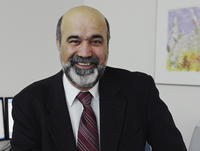BU Brings in Research Compliance Czar
Ara Tahmassian guides faculty through regulation maze

Like lab animals that must negotiate mazes to gain rewards, University researchers have to navigate scores of federal, state, and local agencies that impose stiff research regulations. It’s a process light years away from the fifth-grade science fair, and one with which every BU researcher must comply.
Because most University research funding comes from federal sources, such as the National Institutes of Health (NIH) and the U.S. Department of Agriculture, there are very specific requirements that govern how research is conducted, says Michael Field, BU assistant provost.
“Scientific research often involves working with human beings or animals, so regulations are needed to protect the subjects and the community at large,” he says.
Research compliance has become increasingly important as federal, state, and local governments impose additional regulatory compliance mandates and funding agencies add further restrictions, according to University Provost David Campbell. “It is essential that we conduct our research in compliance with all the applicable statutes and directives,” he says.
In order to aid BU’s efforts to comply, University officials recently appointed Ara Tahmassian as associate vice president for research compliance. Tahmassian oversees all aspects of nonfinancial regulatory compliance at BU and Boston Medical Center. He is also a member of the year-old University Leadership Group (ULG), an assembly of deans and vice presidents that discusses broad University issues and keeps BU officials informed of developments in individual areas.
Tahmassian “is responsible for fostering an environment that promotes integrity and ethical behavior in all matters relating to research compliance,” Campbell says. “His role in the ULG will certainly help our compliance efforts in that it will be an important communication channel for new compliance initiatives to be explained to University leaders.”
More than 80 different agencies dictate how research must be conducted at colleges and universities, says Tahmassian, who earned a Ph.D. in health services at London University and served in various capacities in research compliance at the University of California, San Francisco, for nine years. “These requirements are numerous and cover topics that range from the obvious to the more obscure,” he says.
Both the Charles River and Medical Campuses have a number of committees that regulate all research conducted at BU. Before scientists can begin any type of research, they must present a proposal to the appropriate committee, which reviews it and either approves the research or requests additional information, explains Field.
“Committees are made up of faculty members who are scientists themselves, one nonscientist, and one member of the community,” Field says. “Some also have a veterinarian.”
Depending on the research topic, multiple levels of reviews are conducted. For example, research funded through the NIH undergoes a rigorous scientific review, Tahmassian says, and any research proposal that doesn’t meet accepted ethical norms will likely not be funded. Once a study is approved, post-approval monitoring continues in the form of periodic site visits, audits, and progress reports to ensure that all requirements are followed. For more information on research compliance, click here.
Vicky Waltz can be reached at vwaltz@bu.edu.